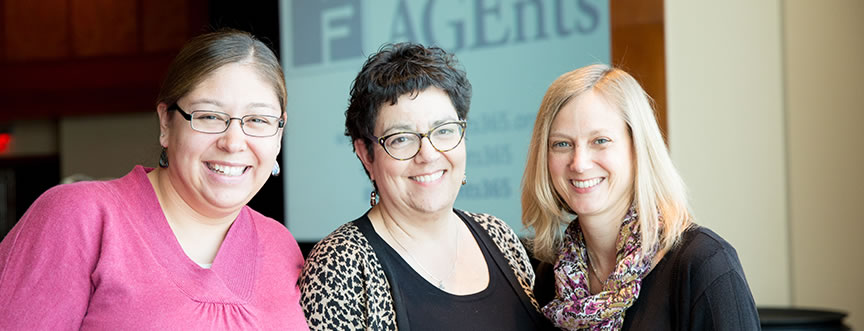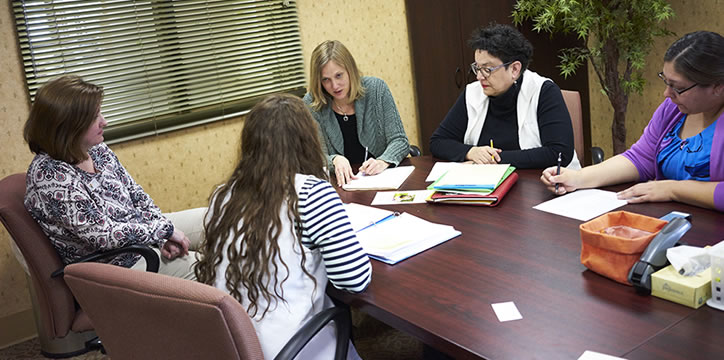Making sure that the wishes of nursing home residents are respected regarding health decisions has been a focus of Dr. Mercedes Bern-Klug’s career, especially as it relates to end-of-life decisions.
“The connections possible through the Hartford Change AGEnts network are so important for exchanging ideas, experiences and encouragement. It is gratifying to be part of a network that supports practitioners and scholars working together on behalf of improving the experience of older adulthood.”
- Mercedes Bern-Klug, PhD, MSW
When the Iowa Legislature enacted a law in 2012 that seemed simple and straightforward, Dr. Bern-Klug understood that it would be challenging to implement across the health system. The law created the Iowa Physician Orders for Scope of Treatment, known as IPOST, a double-sided, one-page, salmon-colored document that permits frail, older adults to clearly declare their preferences for such key life-sustaining treatments as CPR and feeding tubes.
 The team of Nicole Peterson, Mercedes Bern–Klug, and Jane Dohrmann.
The team of Nicole Peterson, Mercedes Bern–Klug, and Jane Dohrmann.
The document, says Dr. Bern-Klug, PhD, MSW, associate professor at the University of Iowa School of Social Work and director of the University of Iowa Aging Studies Program, is a medical order, “like a prescription for what to do or not do,” that physically stays with a person wherever he or she goes within the health care system, from home to ambulance to hospital, from nursing home to hospice.
Dr. Bern-Klug, whose research focuses on nursing homes, as well as palliative care and end-of-life issues, had already been working with Jane Dohrmann, MSW, a social worker with Iowa City Hospice, on a separate county-wide, advanced care planning initiative. And Dohrmann had been working with Nicole Peterson, DNP, ARNP, of the University of Iowa Hartford Center for Gerontological Nursing Excellence, who did her doctoral research project on how one local nursing home was trying to implement the new IPOST law.
One of the things Peterson discovered was that training select nursing home staffers changed very little because the infrastructure in the nursing home was not set up to implement the new law.
“A nursing home is a very complicated system with a lot of moving parts. Even if you train two people on this new document, those two people might not be working when somebody has a cardiac event in the middle of the night or on a weekend,” Dr. Bern-Klug says. “So it was very clear you need to go in and make some system changes.”
It was also very clear to all three that they needed an interdisciplinary team that brought together social work and nursing to make those changes. The first round of Hartford Change AGEnts Action Awards provided the funding to make that possible.
“The stars sort of lined up,” says Dr. Bern-Klug, who participated in the Hartford Geriatric Social Work Doctoral Fellows Program as well as the Hartford Geriatric Social Work Faculty Scholars Program. “The three of us got together around the opportunity for the Hartford award. We each would have done our own thing anyway, but we wouldn’t have done it together.”
As part of the first cohort of nine Change AGEnts Action Award winners, the team of Dr. Bern-Klug, Dohrmann, and Peterson are working with two Iowa nursing homes to understand how best to use the IPOST form.
 At Lantern Park Nursing &
Rehab Center, where they meet
monthly with nurses and social
workers to help them understand
how best to use the IPOST form.
At Lantern Park Nursing &
Rehab Center, where they meet
monthly with nurses and social
workers to help them understand
how best to use the IPOST form.
“We’re helping them provide training for their own staff members,” Dr. Bern-Klug says. “We’re not going to come in as the outside experts. We want these nursing homes to have that expertise, so we’re working very intensively with nurses and social workers who are then training their staff and making education available to families.”
While the pilot project supported by the Action Award deals with a specific state law regarding end-of-life care, it can serve as an incubator to develop other ways that nursing homes can ensure that the wishes of older adults and their families regarding end-of-life decisions are respected.
“The big picture is, are people getting the ‘best for them’ care?” Dr. Bern-Klug says. “Is the type of care that the health care system is providing to this one person congruent with what this one person needs or wants? That’s one measure of quality of care: Are people getting what they want?”
When it comes to end-of-life care, patients, their families, and health providers often face difficult and complicated decisions—especially if the patient is unable to express his or her own choices. The benefits of advance planning reverberate throughout the system.
“If we can pair people with the kind of care they want, that’s good at the individual level, that’s good at the family level, that’s good at the organizational level, and it’s good at the financing level. There are many people who are getting care that they don’t want, and that’s not a good use of limited dollars,” she says.
“It’s not about depriving people of care that they want. Absolutely not. When there’s a clear game plan that everybody has had a chance to weigh in on and agrees with, then things are much more likely to happen. And people are less likely to look back with regret.”